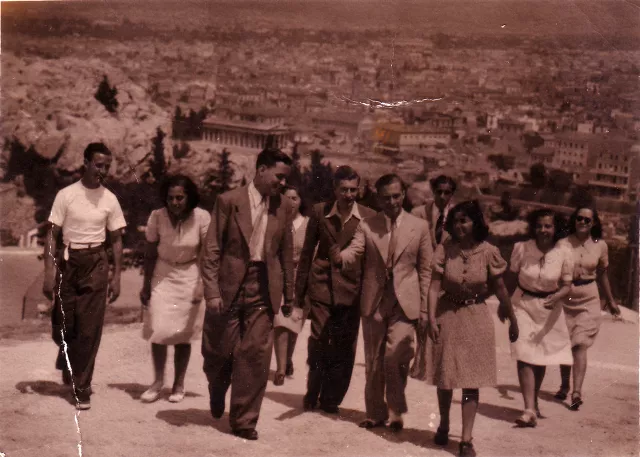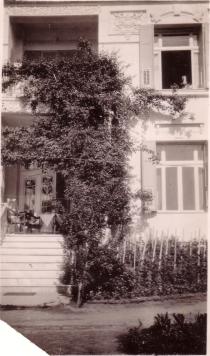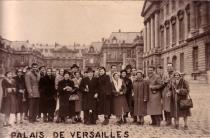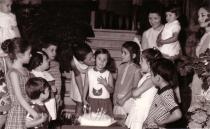This picture is taken when we went to Athens to take the examinations for the Second Baccalaureate.
In 1940 we took only the written examination in Thessaloniki as oral examinations were taking place in Athens. We had passed the written exams and had gone to Athens for the oral ones.
I graduated from primary school and went to high school. The school was called Mission Laique Franiaise. The "Lycee" as they used to call it.
My father preferred to send us at the Mission Laique because we mostly spoke French at home. A French spirit was running the house. And where would we go? At the Lycee. And obviously they considered it as the best because we would get the Baccalaureate diploma.
The Second Baccalaureate was a ticket with much potential. They who had the Second Baccalaureate would get into university without taking exams. I took the classical direction, but there was also a business direction that was shorter in duration.
I didn't go to the business school because my father wanted me to go to the university. With the business diploma you couldn't get into the university. My father wanted to send me to the university to become an engineer for the factory we owned.
At the Lycee, schooling lasted for six years. But after six years you would just take the Baccalaureate diploma. Those who wanted to carry on, would study for the Second Baccalaureate diploma.
For each diploma, you took exams in front of a committee. The committee didn't include any teachers from the school, it was completely neutral.
Lycee was a very good school. We did all the French subjects and all the Greek ones. We were about 25 to 30 children in each class, mostly Jews. Some would come from Albania. Those children that came from Albania, lived in the school dorms. There were about 15 to 20 boarders.
The Lycee had mostly boys. It was something like 60% boys and 40% girls. We had very strong girls. I admit that I always came third or fourth in the class while the first and second would be girls. My brother always came first. He was great.
All the children were from middle class families, children of traders, manufacturers, and legal representatives. We paid tuition fees at the school, pretty high ones.
They did have many expenses though. They were also offering scholarships. My relationship with those children that held scholarships was not any different, we didn't even know that.
We went to school six days a week and Sunday was a holiday. We had school on Saturdays too. We didn't have classes on Wednesday and Saturday afternoon. The rest of the days we did.
We would go at eight o'clock in the morning, we would have classes until 12 or 1am depending on the schedule of the day, and in the evening we would go around 3pm until about 5pm or 6pm. At 6pm we would leave to get home and start studying until 9pm or 10pm at night.
Sometimes, when I would get dizzy and tired, I would take my bicycle and go for a ride before starting my evening study.
We had teachers that were both men and women. We had French and Greek classes. Mathematics, physics, chemistry were all being taught in French. We also had French literature and ancient Greek. That was what the law dictated. The same was with history and geography.
We would do the geography of France that was of little interest to us, and we would also do the geography of Greece. We had a Greek teacher who was teaching us Greek and we also had a French teacher who was teaching us French.
So, we would study in both languages literature, history and geography. To acquire the Baccalaureate one ought to take the exams in French, and it didn't matter whether you had studied in Thessaloniki, or Dijon, or Marseilles. It was exactly the same and that's why the diploma was recognized everywhere.
My favorite subjects were the same as in the primary school. I especially liked physics. I took exams at the polytechnic school and in physics I got 10 out of 10. I was really interested in electricity, sound, radiation, the speed of sound. I didn't like geometry.
While in algebra I was quite good, and in trigonometry, in geometry I couldn't manage. I didn't like subjects like literature and philology, but I was good at them. I was good in essay writing. We wrote essays in both French and Greek.
My parents never came to school. They were satisfied with the grades that I was getting so there was no reason to do so. My mother used to come at the primary school and speak with the teacher, but she never came at the high school.
They weren't even interested, whether we had studied or not. They trusted us because they saw the grades. I was usually either third or fourth in the class. My brother was always first. Why should they go to the school? To ask what?
I graduated in June 1940. I passed my Second Baccalaureate, bachot as they call it. The First bachot is like a high school diploma. Those that wanted to study further, they specialized.
They took the Baccalaureate Science, which consisted of mathematics, physics, chemistry and cosmography. Others that wanted to take the philosophical direction, would take the Baccalaureate Philosophy, which is suitable for lawyers or literature.
I followed the Baccalaureate Sience because I wanted to go to the Polytechnic and my father wanted to send me to Zurich. But when the war started, he didn't have any money to send me there, even though Zurich remained a neutral country.


















































